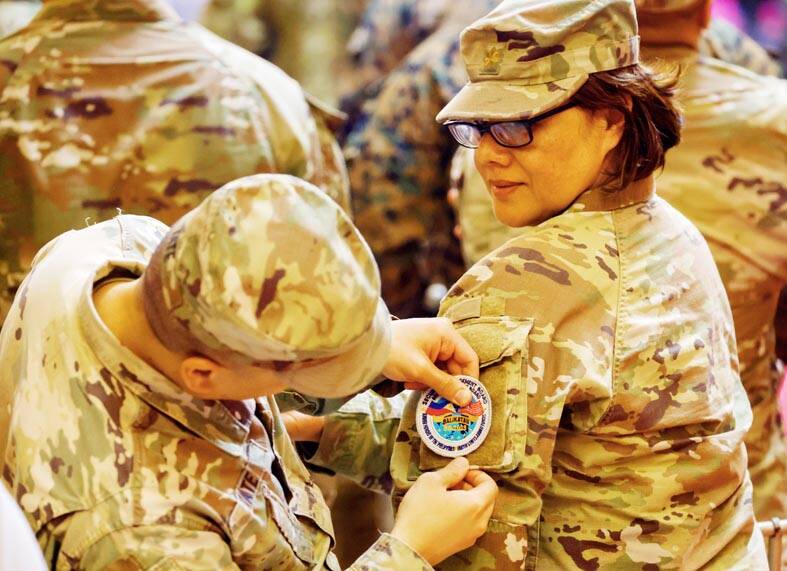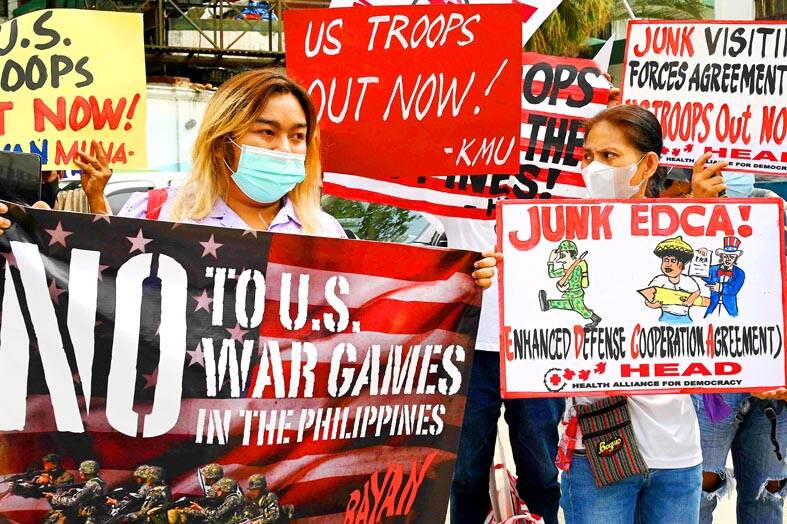US and Philippine forces yesterday launched their largest combat exercises in decades in the Philippines and its waters across the South China Sea and the Taiwan Strait, where Washington has repeatedly warned China over its increasingly aggressive actions.
The annual drills by the allies called Balikatan — Tagalog for “shoulder-to-shoulder” — are to run until April 28 and involve more than 17,600 military personnel.
“The relationships that we have, that we build into these exercises, will make us faster to respond to conflict, crisis, humanitarian assistance and disaster relief,” US Marine Major General Eric Austin said.

Photo: EPA-EFE
About 12,200 US military personnel, 5,400 from the Philippines and 111 Australians are taking part in the exercises, the largest since Balikatan started three decades ago.
The drills are to showcase US warships and fighter jets, as well as Patriot missiles, HIMARS and anti-tank Javelins, US and Philippine military officials said.
In a live-fire drill, US and Philippine forces would sink a target ship in the Philippine territorial waters off the western province of Zambales on April 26, in a coordinated inland and coastal artillery bombardment and airstrike, Colonel Michael Logico, a Philippine spokesman for Balikatan, told reporters.

Photo: AFP
“We have to fire at a target that is closer to what we would expect in an actual threat, which is an intrusion coming from an adversary by sea,” Logico told reporters. “We are demonstrating that we are combat ready.”
Asked if Philippine President Ferdinand Marcos Jr raised any concern that Beijing might be antagonized by the rocket-firing near the waterway, Logico said that did not come up when he briefed the president about the event.
Marcos wants to witness the live-fire drill, he said.
In western Palawan province, which faces the South China Sea, the exercises would involve retaking an island captured by enemy forces, Logico said.
Philippine military officials said that the maneuvers were aimed at bolstering the country’s coastal defense and disaster-response capabilities, and were not aimed at any country.
China last week warned against the intensifying US military deployment to the region.
Chinese Ministry of Foreign Affairs spokeswoman Mao Ning (毛寧) said in a regular news briefing in Beijing that it “would only lead to more tensions and less peace and stability in the region.”

‘TAIWAN-FRIENDLY’: The last time the Web site fact sheet removed the lines on the US not supporting Taiwanese independence was during the Biden administration in 2022 The US Department of State has removed a statement on its Web site that it does not support Taiwanese independence, among changes that the Taiwanese government praised yesterday as supporting Taiwan. The Taiwan-US relations fact sheet, produced by the department’s Bureau of East Asian and Pacific Affairs, previously stated that the US opposes “any unilateral changes to the status quo from either side; we do not support Taiwan independence; and we expect cross-strait differences to be resolved by peaceful means.” In the updated version published on Thursday, the line stating that the US does not support Taiwanese independence had been removed. The updated

‘CORRECT IDENTIFICATION’: Beginning in May, Taiwanese married to Japanese can register their home country as Taiwan in their spouse’s family record, ‘Nikkei Asia’ said The government yesterday thanked Japan for revising rules that would allow Taiwanese nationals married to Japanese citizens to list their home country as “Taiwan” in the official family record database. At present, Taiwanese have to select “China.” Minister of Foreign Affairs Lin Chia-lung (林佳龍) said the new rule, set to be implemented in May, would now “correctly” identify Taiwanese in Japan and help protect their rights, the Ministry of Foreign Affairs said in a statement. The statement was released after Nikkei Asia reported the new policy earlier yesterday. The name and nationality of a non-Japanese person marrying a Japanese national is added to the

AT RISK: The council reiterated that people should seriously consider the necessity of visiting China, after Beijing passed 22 guidelines to punish ‘die-hard’ separatists The Mainland Affairs Council (MAC) has since Jan. 1 last year received 65 petitions regarding Taiwanese who were interrogated or detained in China, MAC Minister Chiu Chui-cheng (邱垂正) said yesterday. Fifty-two either went missing or had their personal freedoms restricted, with some put in criminal detention, while 13 were interrogated and temporarily detained, he said in a radio interview. On June 21 last year, China announced 22 guidelines to punish “die-hard Taiwanese independence separatists,” allowing Chinese courts to try people in absentia. The guidelines are uncivilized and inhumane, allowing Beijing to seize assets and issue the death penalty, with no regard for potential

‘UNITED FRONT’ FRONTS: Barring contact with Huaqiao and Jinan universities is needed to stop China targeting Taiwanese students, the education minister said Taiwan has blacklisted two Chinese universities from conducting academic exchange programs in the nation after reports that the institutes are arms of Beijing’s United Front Work Department, Minister of Education Cheng Ying-yao (鄭英耀) said in an exclusive interview with the Chinese-language Liberty Times (the Taipei Times’ sister paper) published yesterday. China’s Huaqiao University in Xiamen and Quanzhou, as well as Jinan University in Guangzhou, which have 600 and 1,500 Taiwanese on their rolls respectively, are under direct control of the Chinese government’s political warfare branch, Cheng said, citing reports by national security officials. A comprehensive ban on Taiwanese institutions collaborating or